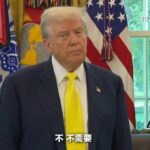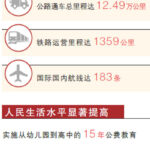“A modern nation must be a nation governed by law.”
Amidst overwhelming applause, the Fourth Plenary Session of the 20th Central Committee reviewed and adopted the “Proposal of the Central Committee of the Communist Party of China on Formulating the 15th Five-Year Plan for National Economic and Social Development,” carving another distinct mark of the era for Chinese-style modernization. The Proposal explicitly states “adhering to comprehensive rule of law, and coordinating the promotion of scientific legislation, strict law enforcement, impartial administration of justice, and law observance by all,” further consolidating the powerful force for advancing the construction of a rule-of-law China.
Guided by clear thinking, the path is steadfastly followed.
In November 2020, the Central Comprehensively Deepening Reforms Committee held its first meeting on law-based governance, formally proposing the Thought on the Rule of Law. In the vast practice of socialist rule of law with Chinese characteristics, this thought guides the deepening and effective implementation of comprehensive law-based governance, continuously breaking new ground in building a rule-of-law China, and laying a solid legal foundation for comprehensively advancing the great cause of building a strong country and national rejuvenation through Chinese-style modernization.
Responding to the demands of the times, conforming to people’s expectations, and closely adhering to the strict enforcement of law, the steps towards sound laws and good governance are more resolute and powerful.
For the first time, writing “unswervingly consolidating and developing the public sector of the economy, and unswervingly encouraging, supporting, and guiding the development of the non-public sector of the economy” into law; for the first time, clearly defining the legal status of the private economy; for the first time, explicitly stipulating that promoting the sustained, healthy, and high-quality development of the private economy is a major long-term national policy… The Private Economy Promotion Law, effective from May 20th of this year, marks another milestone in China’s legal construction with its numerous “firsts.”
Forging key instruments of governance for the nation, laying the foundation of sound laws for good governance.
Following the Civil Code, the legislative process for China’s second law named “Code” – the Ecological Environment Code – has attracted significant attention.
In April this year, the draft Ecological Environment Code was submitted for its first comprehensive review to the Standing Committee of the National People’s Congress. Writing the protection of public health and ecological environment rights into the first article of the draft code; responding to issues that have drawn concentrated public complaints in the ecological and environmental field… A substantial and structurally complete heavyweight code, safeguarding the construction of a beautiful China in the new era, is steadily approaching.
Entering the new stage of development, high-quality legislation is needed to guarantee high-quality development, promote comprehensive deepening of reforms, and maintain overall social stability.
Responding to the demands of the times – enacting the Yangtze River Protection Law, establishing the National Ecology Day, promoting harmonious coexistence between humans and nature; revising the Organic Law of the National People’s Congress, the Organic Law of the State Council, the Legislation Law, etc., to improve the organizational systems of state institutions and related constitutional systems.
Conforming to people’s expectations – enacting and revising the Anti-Food Waste Law, the Food Safety Law, the Organic Law of Villagers’ Committees, the Organic Law of Urban Residents’ Committees, addressing social hot spots, and protecting the legitimate rights and interests of the masses.
Closely adhering to the strict enforcement of law – revising the Supervision Law, promoting the standardization, legalization, and regularization of supervision work; revising the Administrative Penalty Law and the Public Security Administration Punishment Law, ensuring the implementation of strict, standardized, fair, and civilized law enforcement.
“Give full play to the guiding and driving role of legislation.”
Enacting the Hainan Free Trade Port Law, the Rural Collective Economic Organizations Law, revising the Company Law, the Anti-Monopoly Law, the Anti-Unfair Competition Law, achieving the connection between legislation and reform decisions, ensuring reforms are advanced on the track of the rule of law;
Actively adapting to new changes brought by the technological revolution and industrial transformation, accelerating legislation in emerging fields, enriching and improving legal systems in areas such as cybersecurity and biosafety, ensuring the healthy development of new technologies, applications, and business models;
Simultaneously enacting, revising, repealing, and interpreting laws and regulations; the judicial administrative department of the State Council conducted the largest centralized review to date of all over 600 existing administrative regulations, making services for high-quality development more precise…
As of the end of October this year, China has 310 currently effective laws, over


